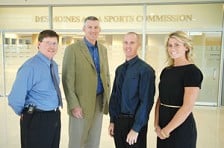Sports Commission roots for the home team

.floatimg-left-hort { float:left; } .floatimg-left-caption-hort { float:left; margin-bottom:10px; width:300px; margin-right:10px; clear:left;} .floatimg-left-vert { float:left; margin-top:10px; margin-right:15px; width:200px;} .floatimg-left-caption-vert { float:left; margin-right:10px; margin-bottom:10px; font-size: 12px; width:200px;} .floatimg-right-hort { float:right; margin-top:10px; margin-left:10px; margin-bottom:10px; width: 300px;} .floatimg-right-caption-hort { float:left; margin-right:10px; margin-bottom:10px; width: 300px; font-size: 12px; } .floatimg-right-vert { float:right; margin-top:10px; margin-left:10px; margin-bottom:10px; width: 200px;} .floatimg-right-caption-vert { float:left; margin-right:10px; margin-bottom:10px; width: 200px; font-size: 12px; } .floatimgright-sidebar { float:right; margin-top:10px; margin-left:10px; margin-bottom:10px; width: 200px; border-top-style: double; border-top-color: black; border-bottom-style: double; border-bottom-color: black;} .floatimgright-sidebar p { line-height: 115%; text-indent: 10px; } .floatimgright-sidebar h4 { font-variant:small-caps; } .pullquote { float:right; margin-top:10px; margin-left:10px; margin-bottom:10px; width: 150px; background: url(http://www.dmbusinessdaily.com/DAILY/editorial/extras/closequote.gif) no-repeat bottom right !important ; line-height: 150%; font-size: 125%; border-top: 1px solid; border-bottom: 1px solid;} .floatvidleft { float:left; margin-bottom:10px; width:325px; margin-right:10px; clear:left;} .floatvidright { float:right; margin-bottom:10px; width:325px; margin-right:10px; clear:left;}
Until recently, Des Moines has sat on the sidelines watching other cities recruit high-caliber sporting events. Wanting to put bids on the events but not having the means to do so, the Des Moines Area Sports Commission patiently waited and continued to go after events it could handle.
As time passed and new venues sprouted downtown, the Sports Commission jumped into the spot¬light and presented Des Moines as an ideal place for national and international sporting events.
“There are events that we can now get that we wouldn’t have even considered before,” said Scott Koch, sports manager for the Sports Commission. “Now, as more facilities have opened up, it has allowed us to recruit more events; and now that the space is available, we can bring in events that we didn’t think about hosting before.”
Koch said additions such as Hy-Vee Hall, Wells Fargo Arena and the James W. Cownie Soccer Park and renovations to Drake Stadium have enabled the Sports Commission to recruit and manage large-scale events. Also, Des Moines’ short commute times have been a deal-maker for some of the events the Sports Commission has successfully brought to town.
“Des Moines is small enough and easy enough to get around,” said Al Lorenzen, vice president of sports and development for the Sports Commission. “It’s a huge selling point. You can get from one side to the other in less than 20 minutes.” Not a lot of cities can say that, he noted.
With these selling points, Des Moines has stepped into the lime¬light for high-caliber sporting events, and the Sports Commission has responded by adding staff and expanding its offices in the Greater Des Moines Convention and Visitors Bureau.
“(Recruiting) has really kicked into gear in the last two to three years,” Koch said. “I think a lot of people see that we can run large-scale events.”
Koch said that in the majority of the events the Sports Commission recruits, 80 to 100 percent of the participants and spectators come from out of town.
“Everyone has to eat, everyone has to stay in a hotel room, and most of these people are renting cars, buying souvenirs,” he said. “(The economic impact) is huge. You’re talking six figures into millions of dollars, depending on the event and how long they are here.”
For instance, this past June, Des Moines hosted the National Collegiate Athletic Association Division I Track & Field Outdoor National Championships, which brought 40,000 guests into town, who in turn, booked 10,950 hotel room-nights during the four-day event.
“It’s our business to make sure (Des Moines) has business,” Lorenzen said. “When the economy is tough, it’s important to bring this type of stuff in.”
Lorenzen illustrated just how significant the economic impact of these events can be by using next year’s Amateur Athletic Union Junior Olympics as an example, which it successfully recruited to Des Moines for 2009. Lorenzen said that this event alone will bring an estimated 35,000 visitors to Central Iowa over 14 days, with an estimated 30,000 hotel room-¬nights, providing a $25 million economic impact in Greater Des Moines.
“It brings new people into the area with new money that wasn’t here before,” Koch said. “But more importantly, it’s about perception.” The Junior Olympics will help prove that Des Moines is capable of hosting an event of this size and can accommodate this many guests, Lorenzen said.
But with any event, especially ones of this size, comes the costs associated with hosting.
“The events do cost money,” Koch said. “There are front-end bid fees that are required, along with other ancillary costs that are unique to different events, but the positives definitely outweigh the negatives. The economic impact is easily greater than the cost.”
Koch said that every year when the Sports Commission is working on its budget, it looks at which events it will host and decides how much money should be set aside to cover the costs.
“Whether it is flying in clients or putting up the bid fee,” he said, “we’ll set aside money in our budget, as well as go out and look for sponsorships throughout the year.”
Currently, the Sports Commission needs to secure more than $400,000 in sponsorships for the 2009 Junior Olympics and plans to have the sponsorships secured by the end of September.
We know where to go “to hit our sweet spots,” Lorenzen said.








